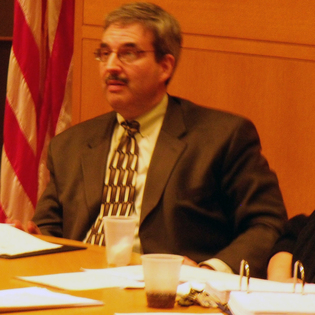If you give us a $500,000 increase in overtime, we promise we won’t run a deficit next year.
That was the pledge made by New Haven Chief Administrative Officer Rob Smuts, defending the police department’s proposed budget to the Board of Aldermen’s Finance Committee Tuesday evening at City Hall.
“We’re coming to you with an increased upfront request,” Smuts said, “but we are making a promise that we are not going to have the type of major deficit that we’ve run in the last several years if this request goes through.”
In the past, he said, overtime requests have fallen far short of what the department has actually spent, but he assured committee members that increased efficiency means this year’s $3.2 million request is accurate.
“Our goal is to actually hit our budgeted number next year,” he said.
Although last year’s request was lower, a $1.3 million deficit is expected to push overtime to about $4.7 million for the fiscal year ending June 30. Next year, Smuts said, the fact that the department would not have to come back for more means actual overtime spending could actually decrease by up to $700,000, bringing overtime back to a level not seen since 2005.
 Alderman Jorge Perez (pictured, left) was not convinced. He grilled Smuts and Assistant Police Chief Stephanie Redding over the fact that the department still plans to spend as much or more on overtime as it did several years ago with fewer staff.
Alderman Jorge Perez (pictured, left) was not convinced. He grilled Smuts and Assistant Police Chief Stephanie Redding over the fact that the department still plans to spend as much or more on overtime as it did several years ago with fewer staff.
“I still don’t understand why I’m giving you more people and there’s more overtime,” he said. “More people should translate to less overtime.”
Redding responded that other factors, including changes in police procedures and rising violent crime ‚were partly responsible for continued high overtime costs, along with an increase in demand for services.
“People are calling the police in larger numbers,” she said, “and we are responding to those calls for service in larger numbers.”
Perez, however, insisted the numbers just didn’t make sense.
“I’m not calling you a liar,” he said, “but you can take figures and manipulate them any way you want.”
Alderman Carl Goldfield was more sympathetic. He said the relationship between overtime and staffing levels seem more complicated than simply “adding officers and chopping overtime.”
“The more officers we have,” he said, “the more policing we’re doing, which by nature brings more overtime.”
Rather than presenting only the raw numbers, Goldfield suggested that the department find a “different way to analyze this,” so that the committee could see not just the total, but also how efficiently the money was being spent.
Smuts agreed, and said that in terms of efficiency, the police are using the overtime funding well.
“You could, for example, look at overtime dollars per calls for service,” he said, “and with that number we’re probably getting a great bang for the buck compared with past years because calls for service have gone up dramatically.”
Ultimately, he said, the overtime spending provides an increasingly good value to the community.
“We have higher expectations, and that’s a good thing.”
More School Spending?
 New Haven schools Superintendant Reggie Mayo and Chief Operating Officer William Clark (pictured) told the committee the $173 million flat spending in Mayor John DeStefano’s proposed budget should be increased to the $178 million approved the by Board of Education, which includes the mayor as one of its members.
New Haven schools Superintendant Reggie Mayo and Chief Operating Officer William Clark (pictured) told the committee the $173 million flat spending in Mayor John DeStefano’s proposed budget should be increased to the $178 million approved the by Board of Education, which includes the mayor as one of its members.
The city, Clark argued, should take up President Obama’s “call to arms” for education and give the schools the extra $5 million.
The 3 percent increase, he said, would be more consistent with school budgets in other areas.
“The average request is well in excess of 3 percent,” Clark said, “and approved budgets are certainly at 3 percent yearly. So we don’t believe we’re off the mark as far as our request goes compared with what we see across the state.”
Budget increases for the New Haven schools over the past three years by contrast, he said, had been an average of 1.6 percent.
Alderman Roland Lemar pressed Mayo for details of what the extra $5 million would buy, and the kinds of cuts that would result if the money did not come through.
Lemar said his constituents are overwhelmingly satisfied with the quality of education their children were already receiving in the city’s public schools, and “feel like $173 million isn’t nothing.”
“I don’t think they see a new influx of money via the property tax as being their sudden call to arms because Barack Obama said so,” Lemar said.
Saying he did not want to “get people upset unnecessarily,” Mayo demurred.
“I don’t really want to get into the specifics if that’s OK,” he said.
He admitted, however, that the brunt of any necessary cuts would probably fall on employees.
“You’ve got to have utilities, you’ve got to have food for the kids, so most of it is going to be personnel.”